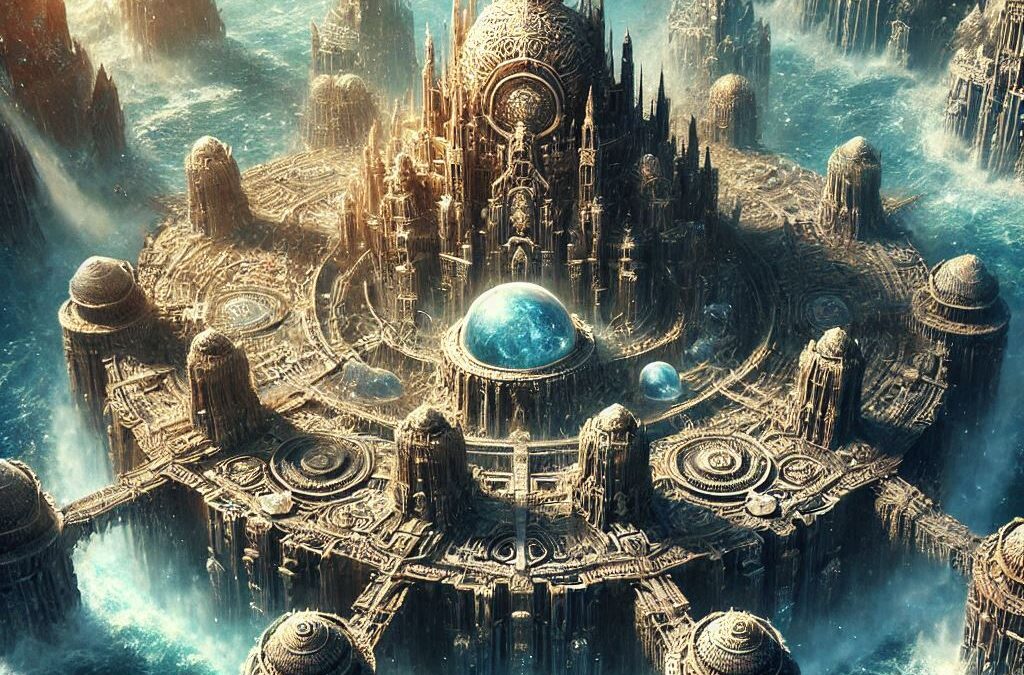In a Nutshell:
The myth of Atlantis, first introduced by Plato over 2,000 years ago, has fascinated explorers, historians, and scientists alike. Described as a powerful and technologically advanced civilization that sank into the ocean, the story of Atlantis continues to spark curiosity and drive modern-day explorations. From submerged ruins to unexplained ancient structures, new discoveries fuel the idea that Atlantis might not just be a myth—but a lost reality waiting to be uncovered. Edgar Cayce, known for his psychic readings, also delved into the mystery of Atlantis, offering intriguing insights into its history and the profound lessons it can teach us.
The Enduring Mystery of Atlantis
1. The Origins of the Legend
Plato’s account of Atlantis, found in his dialogues Timaeus and Critias, tells of a grand civilization beyond the “Pillars of Hercules” (what we now call the Strait of Gibraltar). According to him, Atlantis was a powerful empire that grew corrupt and was eventually destroyed in a cataclysmic event, sinking beneath the waves. For centuries, the story was dismissed as fiction or allegory, but the sheer detail in Plato’s descriptions has led many to believe there might be truth behind it.
2. Evidence of Lost Civilizations
While no direct evidence of Atlantis has been found, several recent discoveries have sparked new theories about the lost civilization:
- Submerged Ruins: Over the last few decades, underwater archaeology has uncovered a number of submerged structures that bear a striking resemblance to Plato’s description of Atlantis. In 2001, researchers discovered what appeared to be massive stone blocks near the coast of the Canary Islands, suggesting the possibility of an ancient civilization in the area. Other sites, like the Bimini Road in the Bahamas, are often cited as evidence of man-made structures that could be linked to Atlantis. These discoveries have sparked debates about the nature of ancient civilizations and their advanced technologies.
- The Mediterranean and the Atlantic Oceans: Some theorists believe that the island of Santorini (ancient Thera) could be the inspiration for Atlantis, given its volcanic eruption around 1600 BCE, which devastated the Minoan civilization. The eruption may have inspired Plato’s tale of a powerful civilization destroyed by cataclysm. Others point to the Azores or the Bahamas as possible locations where Atlantis might have once thrived, based on the presence of unusual underwater formations and ancient artifacts.
3. Theories of Advanced Ancient Knowledge
One of the reasons Atlantis continues to capture the imagination is the idea that it was a highly advanced society. Many theorists suggest that the Atlanteans possessed knowledge or technology far beyond what we think was possible for their time:
- Lost Technology: Some believe that Atlantis had advanced technologies, possibly even harnessing energy sources similar to modern-day electricity or something more esoteric. The notion of a highly developed civilization that could manipulate energy, create sophisticated engineering, and perhaps even shape the environment is a compelling aspect of the myth.
- Astronomical Knowledge: Plato’s accounts often highlight the Atlanteans’ understanding of the stars and their ability to align their society with celestial bodies. This aligns with discoveries of ancient cultures across the globe that show a surprising level of astronomical knowledge, from the pyramids of Egypt to the ancient Mayan calendar. Some even suggest that the Atlanteans may have been aware of celestial events like the precession of the equinoxes, a cycle known only to modern astronomers.
4. New Explorations and Discoveries
In recent years, scientists have revisited the search for Atlantis, using modern technology to explore potential sites:
- Sonar and Underwater Mapping: Advances in sonar technology have allowed scientists to scan vast portions of the ocean floor, discovering previously unknown submerged structures. One of the most significant examples was the 2017 discovery of an unusual formation off the coast of the Bahamas. The grid-like structure is considered by some to be too symmetrical and precise to be natural, fueling speculations about its connection to Atlantis.
- The Azores and Canary Islands: Ongoing research in these areas suggests that the island chain may have once been a part of a larger landmass, potentially linking to the lost continent of Atlantis. Geophysical studies and underwater archaeology continue to unearth clues that could change our understanding of ancient civilizations in the Atlantic.
5. Edgar Cayce’s Insights on Atlantis
Edgar Cayce, often called the “sleeping prophet,” made numerous predictions and offered detailed descriptions about Atlantis during his trance readings. According to Cayce, Atlantis was a real civilization that existed more than 10,000 years ago and was a center of advanced technology and spirituality. He suggested that the people of Atlantis had a deep connection to the Earth and its energy, using crystal power, possibly in ways we are only beginning to understand today. Some of his key insights include:
- The Fall of Atlantis: Cayce described the downfall of Atlantis as a result of internal strife and a loss of spiritual alignment, echoing Plato’s story of a civilization’s hubris leading to its destruction. He predicted that the sinking of Atlantis was caused by a series of natural disasters, including massive earthquakes and volcanic eruptions.
- The Role of Atlantis in Our Evolution: Cayce also suggested that the wisdom of Atlantis would one day return to humanity. According to him, certain individuals would begin to tap into the knowledge of Atlantis in the coming age, helping to usher in a new era of spiritual enlightenment and technological advancement.
- Atlantis’ Influence on Other Cultures: Cayce’s readings also suggested that the Atlanteans’ influence spread to other ancient cultures, including the Egyptians and the Mayans. He believed that the knowledge of Atlantis was passed down through these civilizations, though in a distorted form, to prevent misuse of the advanced technologies that had led to its destruction.
6. The Psychology Behind the Myth
The enduring appeal of Atlantis is also psychological. The idea of a lost, advanced civilization taps into our collective desire to uncover hidden truths and explore the unknown. It represents humanity’s fascination with the possibility that history holds secrets—secrets that, if revealed, could radically alter our understanding of our past and capabilities.
The Takeaway:
While definitive proof of Atlantis remains elusive, new discoveries and technological advances are bringing us closer to understanding whether the story holds a kernel of truth. As we continue to explore the depths of the ocean and uncover ancient ruins, the myth of Atlantis may eventually evolve from a fantastical legend to a chapter in our real, lost history. Edgar Cayce’s readings continue to provide intriguing insights into the possibility that Atlantis was not just a myth, but a pivotal part of our ancient past with profound lessons for the future.
Citations:
- Plato, Timaeus and Critias
- “Bimini Road,” National Geographic, https://www.nationalgeographic.com/news/
- “Submerged Structures Discovered Near the Canary Islands,” Underwater Archaeology News, 2020.
- Edgar Cayce, The Edgar Cayce Readings on Atlantis, A.R.E. Press.

